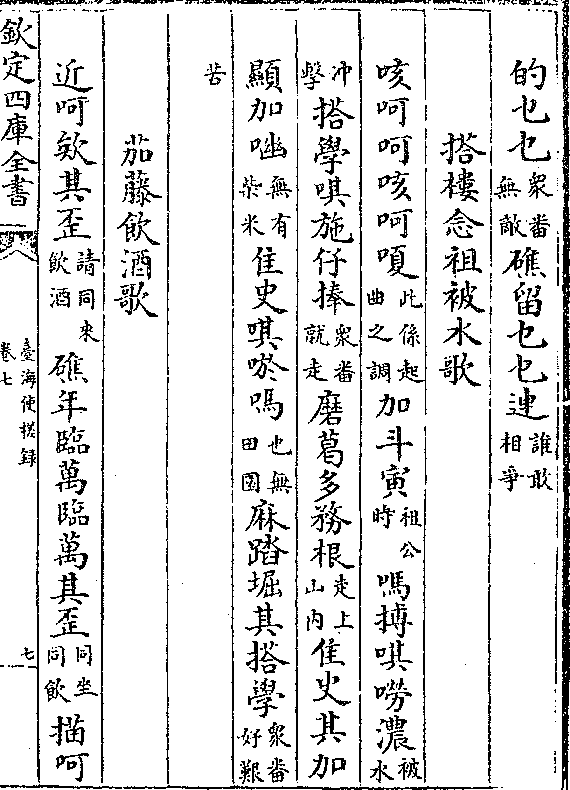[[OOC  :As a coda to this discussion, I would like to offer an example of Han script being used to write my ancestral language, using Hokkien phonetics. It really illustrates the limitations of Sinography, especially as applied to Austronesian languages. 1/ https://twitter.com/ZevHandel/status/1340914953658593281
:As a coda to this discussion, I would like to offer an example of Han script being used to write my ancestral language, using Hokkien phonetics. It really illustrates the limitations of Sinography, especially as applied to Austronesian languages. 1/ https://twitter.com/ZevHandel/status/1340914953658593281
 :As a coda to this discussion, I would like to offer an example of Han script being used to write my ancestral language, using Hokkien phonetics. It really illustrates the limitations of Sinography, especially as applied to Austronesian languages. 1/ https://twitter.com/ZevHandel/status/1340914953658593281
:As a coda to this discussion, I would like to offer an example of Han script being used to write my ancestral language, using Hokkien phonetics. It really illustrates the limitations of Sinography, especially as applied to Austronesian languages. 1/ https://twitter.com/ZevHandel/status/1340914953658593281
Tag: @quoyu_romatsy @jyutzigoigaak @catielila @tanchunkiet @kerslake_andrew @kerim @joshiunn @ArthropodFrog @xiao_collective
加斗寅,嗎摶唭嘮濃,搭學唭施仔捧;磨葛多務根,佳史其加顯加㗀,佳史唭唹嗎,麻踏堀其搭學!
Got that? 2/
加斗寅,嗎摶唭嘮濃,搭學唭施仔捧;磨葛多務根,佳史其加顯加㗀,佳史唭唹嗎,麻踏堀其搭學!
Got that? 2/
The above was written in a survey of western Taiwan's indigenous societies in 1722, conducted by Qing officials. Known as 番俗六考, it documented customs, lifestyles, and most importantly for our discussion, songs. 3/
All of them were Austronesian, written in Han characters with Hokkien phonetics.
Already, you start to see the same problem that bothered King Sejong. The phonotactics of monosyllabic Sinitic Hokkien simply could not align with polysyllabic Austronesian languages at all. 4/
Already, you start to see the same problem that bothered King Sejong. The phonotactics of monosyllabic Sinitic Hokkien simply could not align with polysyllabic Austronesian languages at all. 4/
Particular consonants like r, lzh, lj, q, etc… are simply incapable of being rendered in Han characters with accuracy, even with a language with a rich consonantal inventory as Hokkien.
And on that note, what pronunciation are we using? As many Hokkien speakers know, 5/
And on that note, what pronunciation are we using? As many Hokkien speakers know, 5/
many characters have two pronunciations, literary and colloquial. How do we know if we should pronounce 學 as óh or hák?
Contrast this with the earlier Latinization of Siraya by Dutch missionaries, where there are very few ambiguities in pronunciation. 6/
Contrast this with the earlier Latinization of Siraya by Dutch missionaries, where there are very few ambiguities in pronunciation. 6/
In fact, Latin script Siraya lasted well into the 18th century, a full century after the Dutch had left! This was most prominently seen in the land contracts between Siraya and Han settlers, known collectively as the Sinkan Manuscripts. 7/
That's a testament to how alphabetic script was much more suited to Austronesian languages, and now the vast majority of them are written in Latin letters (albeit because of colonialism).
But back to Hanji. A big contrast is with the indigenous tongues that were never written. 8/
But back to Hanji. A big contrast is with the indigenous tongues that were never written. 8/
Under the influence of assimilation policies and societal discrimination, languages like Taokas and Ketagalan were discouraged in favor of Han speech, i.e. Hokkien/Taiwanese. There were very few efforts to understand the tribes, and only then to control them. 9/
What little that has been recorded of those languages before Japanese modernity is entirely in Hanji. Between 文白 & 漳泉, there are too many ambiguities to produce accurate reconstructions without a solid background in Austronesian linguistics. 10/
Those attempting to reconstruct Old Korean Idu-Hyangchal writing know this problem all too well. At the very least, our languages were never written using 訓 readings!
That said, just what was being said in that song, the 搭樓念祖被水歌? Well, here it is: 11/
That said, just what was being said in that song, the 搭樓念祖被水歌? Well, here it is: 11/
祖公時,被水沖擊,眾番就起;走上山內,無有柴米,也無田園,眾番好艱苦!
At the time of our Ancestors, when we were struck by water, the s*v*ges rose up; they went up to the mountains, where there was no firewood or rice, and no fields — how bitter were the s*v*ges! 12/
At the time of our Ancestors, when we were struck by water, the s*v*ges rose up; they went up to the mountains, where there was no firewood or rice, and no fields — how bitter were the s*v*ges! 12/
A proper translation:
That year, water struck, and the People were stirred alert; we went to the mountains, where there was no firewood or grain, where there were no fields. How scared were the People!
Sorry, no transliteration. It'd still be too tentative anyway. 13/
That year, water struck, and the People were stirred alert; we went to the mountains, where there was no firewood or grain, where there were no fields. How scared were the People!
Sorry, no transliteration. It'd still be too tentative anyway. 13/
But this illustrates the difficulty of transposing Han writing on non-Sinitic languages. @ZevHandel wrote all about the workarounds, but unfortunately for many Plains Indigenous Taiwanese, it was far too late before a solution could be made. 14/
Perhaps if Indigenous cultures were respected, maybe we'd see the development of a Taiwanese script for Austronesian languages in the Sinospheric style.
So how should 學 be pronounced in that song? Well, look at this account's name and avatar for a clue. 15/End.]]
So how should 學 be pronounced in that song? Well, look at this account's name and avatar for a clue. 15/End.]]

 Read on Twitter
Read on Twitter




